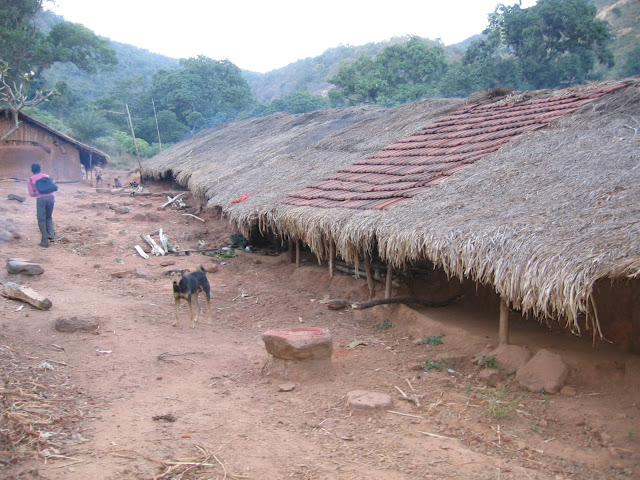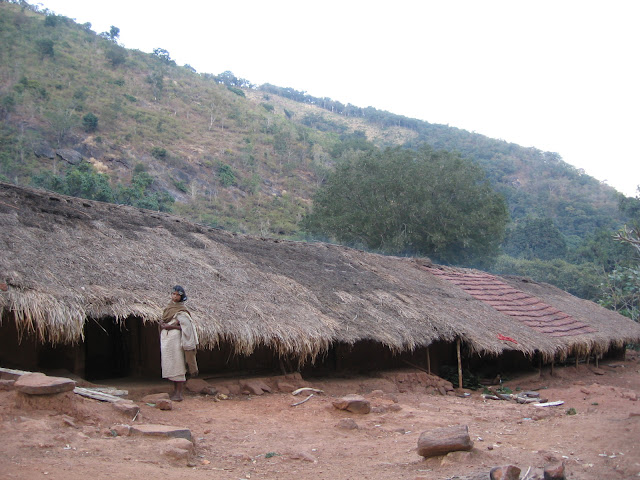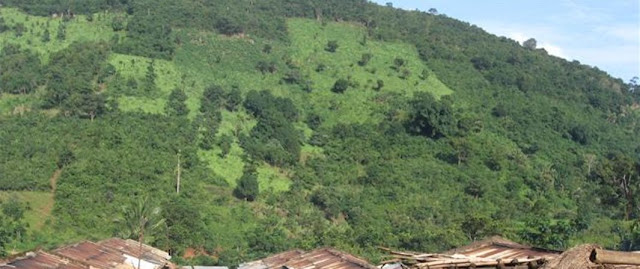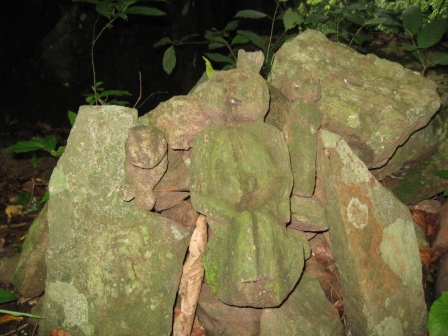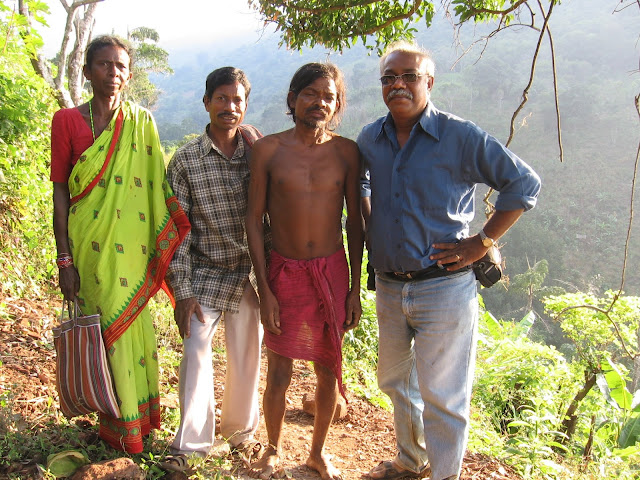The Dongria Khondo Of Odisha
I have come as a light into the world, that whoever believes in Me
should not abide in darkness. Joh12:46
Introduction
The Dongria Khondos are a community of hill- dwelling (Dongar means high-hill land)primitive people.
They inhabit exclusively, on the wooded Niyamagiri hill ranges of Rayagada district of Orissa. They are distinct in their language and culture from the neighboring population of tribes and castes of the plains.
The Dongria Khondos are a community of hill- dwelling (Dongar means high-hill land)primitive people.
They inhabit exclusively, on the wooded Niyamagiri hill ranges of Rayagada district of Orissa. They are distinct in their language and culture from the neighboring population of tribes and castes of the plains.
Until recently the Dongria Khondos have remained untouched by the effects of civilization. They have continued to maintain age-old forms of economy, social organization, rituals, and beliefs, and have persisted in the speculation of hill regions separated by formidable natural barriers. However, they have retained their uniqueness based on the common cultural theme of their patriarchs.
Meriah Sacrifice:
They are infamous in history for their Meriah sacrifice. In his book DAWN ON THE KHOND HILLS Mr. S. Pearce Carey M.A writes " to avert the graver woes of epidemics such as smallpox or ruined harvests, far more solemn sacrifice had to be made to malignant enmities could only be propitiated by the blood-shedding, not of fowls or goats, or even buffaloes, but of men.
So they contrived to procure such human victims, for the most parts through secret agents from the plains, and get them kidnapped to their hills. Frequently these victims, or Meriahs, as they were called, and were nurtured until they were at least seven, though all the while they were marked for the slaughter.
Meriah Sacrifice place in one of the village
When the fearsome rites were due, the villagers would flock together for a three-days' festival, and there would be much eating and drinking and dancing. On the appointed day, the victim decorated with wildflowers would be led in procession, accompanied by music, dance, and song. On the morrow he or she would be anointed with turmeric and oil, and if the folks were merciful, would be stupefied with drinks or drugs; and, when bound, or with elbows and knees were broken, would amid great excitement be knocked senseless by the blow of the priest's axe, which would be signal for the general rush. In a few seconds, the flesh would be cleft from the bones, and the precious portion would be carried post-haste to fields in each village for burial, as the guaranty of a good harvest. The next day they mourn for the Meriah. "
It was practiced regularly in the past until the British government put an end to this weird and barbarous treatment of innocent victims.
Now with the advancement of civilization, the Meriah victims are replaced with buffalo sacrifice.
Ecology and Settlement Pattern:
The background against which the villages stand is pictorial. If one views a village from a distance he would find some low-thatched houses almost lost in greenery. In the shady mango groves, one could hear the twittering of birds, the murmuring of the streams and the rustling of the leaves.
The visitor is overwhelmed at the first glance by a sense of serenity, beauty, and happiness, which rouses his emotions, inspires his heart, captivates his mind, and fascinates him.
The Khondo cleared the hill slopes for shift cultivation. Plenty of jackfruits, orange, and mango trees grow in the hills. Pineapple and orange grow on the slopes.
Wildlife is extinct, due to shift cultivation and the depletion of the forest but for a few bears, and occasional panthers.
Life Style:
Migration:
The Dongria Khondo use to migrate from one area to another within the hill country and not beyond. They have a belief that the drought, an outbreak of cholera and small poxes befall on them as a result of the wrath of the village deities and particularly the earth goddess. Besides, they migrate to places for exploiting forest resources once the forest is depleted and unsuitable.
Very often individual migrate to the village of the kinsmen. The Dongria Khondo boy has to serve for at least four years in his would-be father-in-law's house before his marriage. Reminds us Jacob of the Holy Bible.
Social Structure:
Both simple and complex types of families are found in the Dongria Khondo culture. The complex families are either polygamous or extended ones with several brothers linearly related to one another. They live together with their spouses and children under one common family head.
As they are shifting cultivators they practice polygamy for more manpower.
The story of the flood:
A number of mythical stories allude to different clans origin. One popular story is of a man called Kumbu of Wengesika Clan. On one of his hunting trip in the jungle, he aimed at a deer, which was pregnant. The calf from the womb warned the mother, and she, in turn, told the hunter to save his own life since the whole world is going to be destroyed by the flood. She told him to make a hole in the trunk of the local tree and make a boat out of it in such a way that water couldn’t enter it. So Kumbu, along with his only sister Dumbe and with some provision went into it. On a specific day, suddenly a terrible storm broke out with heavy rain and everything vanished including the hilltops.
Then the Niam Raja (King Niam) came down to stop the rain. He saw something floating on the water but he could not understand what it was. He created seven phantom suns for the water to dry. But without worship of man, Niam Raja's body was swollen and assumed the appearance of a leper rubbing off. From his thigh, he collected dried skins and dirt and created a man. He wanted human beings to worship Niam Raja so that he can be cured of leprosy. The "Man" went about but could not find any.
In the meantime, Kumbu and his sister Dumb came out of the bout when the water dried up. They went in different roads to find another human being. After a long walk, they met each other but they could not recognize each other. So they were attracted to each other and settled and produced new offspring.
The Salpa Drink:
A sago palm tree named Salpa grows in this area. They prepare a strong drink out of its juice by mixing some roots and are under the iron clutches of this drink. Everybody drinks, Old and young, men and women, boys and girls. It "Steals" their happiness, It "kills" their life, It "destroys" their future. John 10:10a.
Many men die young because of their addiction to this drink. However, the addiction to this drinking unites them, which leads to dissension among the families or even lineages and sub-clans, which eventually lead to blood feuds.
Girls Dormitory:
Behind the houses is girl's dormitory. It is decorated with triangular designs of alternate white and red colors. There is a natural desire on the boys and girls to attend the Dormitory.
Young men from different clans visit the dormitory late in the evening and leave the place before dawn. Indeed the husband would never allow his wife to revisit the dormitory but he himself cannot stop this habit after marriage.
The sleeping partners are exchanged. If they develop love with each other then they marry.
The boys wear more ornaments to attract girls.
Often, villages pick a quarrel for one girl.
The sleeping partners are exchanged. If they develop love with each other then they marry.
The boys wear more ornaments to attract girls.
Often, villages pick a quarrel for one girl.
Their Economy:
Dongria Khondos are shift cultivators and they keep Orchards. They work very hard to earn their living. Besides the production from cultivation, they depend upon forest resources for their daily needs of life.
They consume mainly cereals and pulses and relish on meat. They also raise livestock like goats, pigs, and poultry for their protein requirement and for their ritual sacrifice.
Their Technology:
Their technology is simple. They possess only a few tools.
The axe is the most important tool for them and is used for multiple purposes including offense and defense.
The Domb Neighbours:
Domb is a scheduled cast neighbor of the Dongria Khondos. It is interesting to note the interdependency between the Domb and the Dongria Khondos. They weave clothes worn by the Kondo and they are agriculture labourers too. Domb supplies them with essential articles.
Essentially the Domb serves the Dongria Khondos in three capacities.
The Domb acts as their Barika, the manager. It is through him that sales of products, advances for leases of the fruit-bearing tree and standing crops are arranged for the Khondo. He is the go-between, in the social and political affairs of the Kondos.
The Domb acts as their Barika, the manager. It is through him that sales of products, advances for leases of the fruit-bearing tree and standing crops are arranged for the Khondo. He is the go-between, in the social and political affairs of the Kondos.
Secondly, he acts as the village street sweeper, and thirdly the cattle watcher. Now the Domb from the plains country finds it profitable to live among the Dongria Khondos even without owning any land, raising no crops.
Thirdly they deal in the products of the Kondos and their number has steadily increased in the hills.
Social States:
The Dongria Khondos are socially neglected, economically poor, and educationally illiterate and totally primitive isolated community. For centuries they are under the clutches of Satan.
Few attempts by some M's to reach them have failed because of the formidable terrain with the hostile condition. Only up to 5 miles any vehicle can travel with much difficulty.
The rest of the distance is steep hill tracks and rough footpath has to be covered by foot, except for one side of the hill.
Steep hill tracks
The rest of the distance is steep hill tracks and rough footpath has to be covered by foot, except for one side of the hill.
Dongria Kondos have enemies within and without. While the Social oppression and economic exploitation come from elements outside the tribal society. Drink and demon exist within them. Both are equally dangerous and leads to the destruction.
Drinking habit:
Drinking and dancing often end in immoral acts. Drinking also leads to violence. The main reasons for the poverty of the Dongria Kondos are the habit of excessive drinking. Imbibing strong drinks to them is just like we drink coffee or tea.
Almost everyone drinks in the community men and women, Old and young, boys and girls, and children even the newborn babies and even the dying ones drink! Newborn babies are fed with drink so that it will sleep quietly and the mother can work undisturbed.
They also pour some drink into the mouth of a dying person that this would be his last chance of consuming a drink before his death. Thus, the drinking habit is part of their daily life, and it is a self-destructive culture of the Dongria Kondos.
Almost everyone drinks in the community men and women, Old and young, boys and girls, and children even the newborn babies and even the dying ones drink! Newborn babies are fed with drink so that it will sleep quietly and the mother can work undisturbed.
They also pour some drink into the mouth of a dying person that this would be his last chance of consuming a drink before his death. Thus, the drinking habit is part of their daily life, and it is a self-destructive culture of the Dongria Kondos.
Excessive Drinking:
The excessive drinking has been a curse to the Dongria Kondos. It destroys their self-control and leads to quarreling and fighting which ends up in self-destruction. Some justify drinking as a part of their tribal culture. Yes, it is the bad element of the tribal culture. Others argue that the tribals work hard the whole day needs some relaxation. Nevertheless, more than relaxation drinking leads them to sickness, disease, and feud, which results in absolute poverty.
Demons:
Another self-destructive aspect of the Dongria Kondos is the belief in spirits, and the practice related to spirit worship.
This leads to other evils such as magic, witchcraft, sorcery, and exorcism. The Kondos believe that the spirits reside on the trees and on the outskirts of the villages, emerging as predators at night and possesses the people.
Such beliefs lead to the exorcism of the spirits. They practice witchcraft and magic to settle enmity with one another. As a result, the male population of the Dongria Kondos reducing drastically.
 |
The illiteracy of the people is exploited by the witch doctors and every illness, death, misery, and trouble in the village is attributed to some divine wrath.
Our Response:
Our response to the challenges we face today is one of love in action:
- Through Education,
- Through Socio-Economic development,
- By bringing love and peace among the Dongria Kondos,
- By caring for the physical needs,
- By bringing community awareness,
- By encouraging the Dongria Kondos Culture,
- By preaching the gospel of our Lord Jesus Christ.
Through Education:
Ignorance has been one of the basic reasons for many of the problems faced by the Dongria Kondo. Therefore, one of the strategies that we follow as pioneer developers is to educate people.
Learning to write
There is rapid progress
High school students from our center
Learning centers for children in Non Formal education are designed to suit the needs of the Dongria Kondo in their cultural and environmental context. Personal health, sanitation, and civic sense are highlighted. Through Socio-Economic development:
The main problem faced by the Dongria Kondo is the merchant's exploitation of their products.
With hard labor, they produce or collect forest products, and they carry it on the rough route all the way from the hills to the plain only to sell for a meager price. The major portion of the hard earned money is spent on liquor.
An awareness program needs to be designed to explain the Dongria Kondo the need to be wise in his earning and spending.
A cooperative movement to be mobilized to bailout the Dongria Kondo from the clutches of the exploiters.
By bringing love and peace among the Dongria Kondos:
The inter-clan feud among the Dongria Kondos was at its peak during the last two decades. The result of which is felt even today. Though the reasons may be trivial, the outcome of the feud is unbelievable. Sometimes they even carry the feud to generations.
Often time frustration is the cause for the feuds, thou the superficial reason may be many, and insignificant, frustration leads to disappointment.
Therefore, in order to be satisfied in life, one has to pursue the TRUTH and only the TRUTH will set them free from every kind of bondage, as a result Peace and Harmony will prevail. So it is imperative that the Good News be taken to them at once.
By caring for the physical needs:
The Dongria Kondo has many needs of which the most important is education on health, sanitation, and civic sense.
One of the areas we are focusing is on malnutrition.
"Nutritious Supplementary Sustenance Program" is an ongoing program for the children.
Many of the people are deprived of even the basic medical attention.
Awareness on prevention of Cholera through Storytelling
Many of the people are deprived of even the basic medical attention.
Bringing community awareness:
Awareness on prevention of Cholera through Storytelling
roleplaying. Teaching the parents how to care for their children.Through WaSH (Water, Sanitation, and Hygiene) program.
By encouraging the Dongria Kondos Culture:
The Dongria Kondos has a rich heritage and culture.
They are very distinct in their appearance, dress habit, food habit, customs, language, attitude,
One of the main objectives is to bring in changes to the Dongria Kondos in their local context. They are well adapted to the harsh local surroundings.
As an outsider, we may not fully comprehend them. Therefore, any change outside the local framework would result in non-acceptance and disastrous effects.
Keeping this in mind, only issues contradicting Biblical ethics; like drinking, tobacco, polygamy, adultery, animism will be confronted without compromise.
By preaching the gospel of our Lord Jesus Christ.
“For though I preach the gospel,
I have nothing to glory of for necessity is laid upon me;
yea, woe is unto me, if I preach not the gospel!” 1 Cor 9:16
We have no option but to share the Word of God.
A small group of dedicated God-fearing bible believing men have committed their lives to bring glory to our Father in Heaven among the Dongria Khondos, to bring His Kingdom on their land and His will to be done among them.
That they will have their daily bread,
live in harmony among their brothers;
lead a holy life free from fornication,
Maybe if you are challenged, to win these people for the Kingdom of God, please pray for wisdom, to show you the way; to reach this people group.









